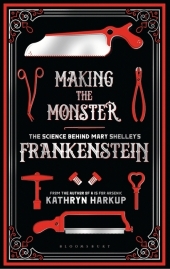 Neuerscheinungen 2018Stand: 2020-02-01 |
Schnellsuche
ISBN/Stichwort/Autor
|
Herderstraße 10
10625 Berlin
Tel.: 030 315 714 16
Fax 030 315 714 14
info@buchspektrum.de |

Kathryn Harkup
Making the Monster
The Science Behind Mary Shelley´s Frankenstein
Export/Airside. 2018. 304 S. 11 black and white illustrations. 8.503937 in
Verlag/Jahr: BLOOMSBURY TRADE; BLOOMSBURY SIGMA 2018
ISBN: 1-472-93374-5 (1472933745)
Neue ISBN: 978-1-472-93374-4 (9781472933744)
Preis und Lieferzeit: Bitte klicken
A thrilling and gruesome look at the science that influenced Mary Shelley´s Frankenstein
The year 1818 saw the publication of one of the most influential science-fiction stories of all time. Frankenstein: Or, Modern Prometheus by Mary Shelley had a huge impact on gothic horror and science-fiction genres, and her creation has become part of our everyday culture, from cartoons to Hallowe´en costumes. Even the name ´Frankenstein´ has become a by-word for evil scientists and dangerous experiments. How did a teenager with no formal education come up with the idea for an extraordinary novel such as Frankenstein?
Clues are dotted throughout Georgian science and popular culture. The years before the book´s publication saw huge advances in our understanding of the natural sciences, in areas such as electricity and physiology, for example. Sensational science demonstrations caught the imagination of the general public, while the newspapers were full of lurid tales of murderers and resurrectionists.
Making the Monster explores the scientific background behind Mary Shelley´s book. Is there any science fact behind the science fiction? And how might a real-life Victor Frankenstein have gone about creating his monster? From tales of volcanic eruptions, artificial life and chemical revolutions, to experimental surgery, ´monsters´ and electrical experiments on human cadavers, Kathryn Harkup examines the science and scientists that influenced Shelley, and inspired her most famous creation.
Lucidly illuminates Shelley´s investment in the rapidly expanding knowledge of chemistry, biology and electricity of her times, and reminds us of how Frankenstein helped inspire technological developments, such as the pacemaker. Wall Street Journal
Harkup, Kathryn Kathryn Harkup is a chemist and author. Kathryn completed a PhD then a postdoc at the University of York before realising that talking, writing and demonstrating science appealed far more than spending hours slaving over a hot fume-hood. Kathryn went on to run outreach in engineering, computing, physics and maths at the University of Surrey, which involved writing talks on science and engineering topics that would appeal to bored teenagers, and she is now a science communicator delivering talks and workshops on the quirky side of science.


